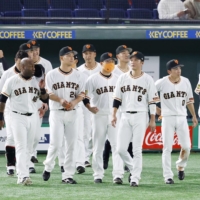Just before the Yomiuri Giants and Yokohama BayStars went into the bottom of the ninth tied 7-7 on March 26, the first night of the season, there was an announcement over the PA system at Tokyo Dome.
It was a reminder there would not be any extra innings played and that the contest wouldn’t go past the ninth. It didn’t really matter in the end, though, as Yoshiyuki Kamei belted a walk-off home run for the Giants a few minutes later.
The Giants and BayStars, however, did end up tying on March 28 after nine innings. Overall, there were eight tie games through the first 70 contests of the NPB season. It took a entire month to reach that many in 2020. As long as games are halted after nine innings, there will probably continue to be a few more draws than usual.
While NPB did away with extra-inning games (for this season only) for a good reason, the execution has left something to be desired — namely, more baseball.
A nine-inning tie is even less satisfying than its 12-inning cousin. At least when games could go to 12 innings, there was ample time to decide a winner. The free baseball also came with the added tension that anything that happened could be the decisive blow.
As it stands this year, clubs can start playing — and bunting — for a tie just when things should be getting good.
It’s worth noting NPB didn’t get rid of extra innings just for the sake of it. It’s in part due to the COVID-19 situation. When restaurants and bars in the Tokyo metropolitan area were asked to close by 9 p.m last month, NPB decided to shorten the length of games, which generally begin at 6 p.m. on weeknights.
On March 23, three days before the first pitch of the year, the league announced extra innings would not be played.
So this is where the league is this year. Not only are there probably going to be more ties — determining a winner is kind of the point of keeping score — it also changes the way the game is played in the late frames. The games of chess managers play with their bullpens and rosters is lessened and, competitively, teams with shallow bullpens benefit from fewer innings. Not to mention there’s three fewer chances to see a walk-off hit or home run.
Tie games already feel somewhat lacking with no clear winner. They feel even more incomplete, and almost cheapened, by chopping three innings off the end.
It didn’t even have to be like this. NPB was impacted by COVID-19 to a greater degree last year but allowed for one extra inning. That system could have simply been brought back. There was also room to be even more aggressive and follow MLB’s lead and begin extra innings with a runner on second.
Another idea would’ve been to implement the rules put in place following the 2011 Great East Japan Earthquake and tsunami. Back then, with an eye on conserving energy, NPB declared that after the ninth inning, no new extra inning would start once a game had passed 3 hours, 30 minutes.
Stopping games after nine innings probably isn’t even going to solve the issue it’s meant to address.
Through Thursday, the average time of a game this season was 3 hours, 11 minutes. The average length of a nine-inning game last season was 3:13, while the overall length, including extra-inning games, was 3:16.
That’s in line with where NPB has been. Since 2001, the average length of a nine-inning game has only dipped below 3:10 six times — with the shortest being 3:06 in 2011.
Given NPB is only pushing up start times — and even then just by 15 minutes, usually — in the Tokyo metropolitan area, there wouldn’t seem to be much difference in playing nine innings or 10 again this season.
Tie games, of course, are nothing new to Japanese baseball fans. It’s just something that comes with the territory. Whether it’s in the regular season, the playoffs or even Japan Series, games might end without a winner or loser.
In exchange, there’s no danger of NPB games lasting 13 or 14 innings or more, as can happen in MLB.
Ties aren’t great, but the system works — and honestly, if the game isn’t decided through 12, then it’s not the end of the world.
Cutting games down to nine innings, though, takes something away from the baseball and leaves tie games feeling even emptier than they do normally.
In a time of both misinformation and too much information, quality journalism is more crucial than ever.
By subscribing, you can help us get the story right.
Source : Baseball – The Japan Times
